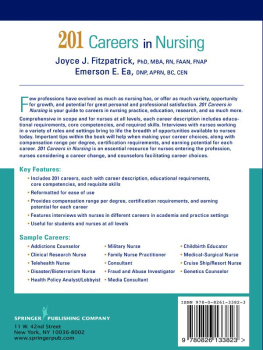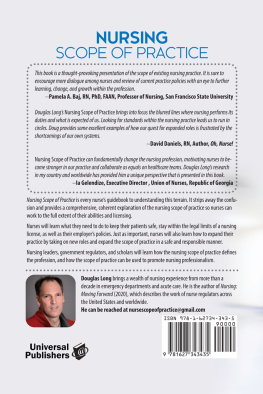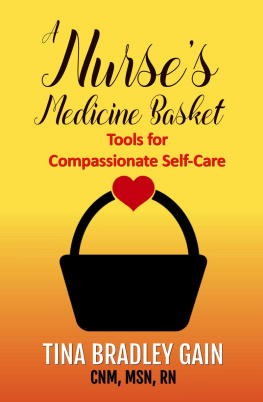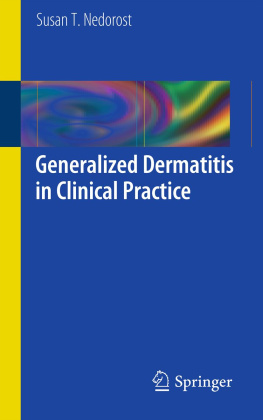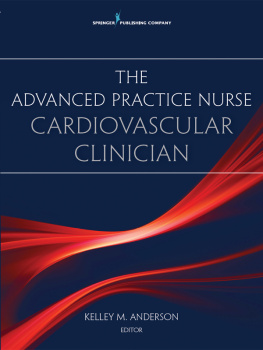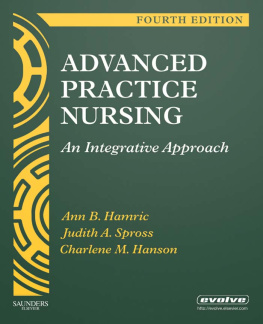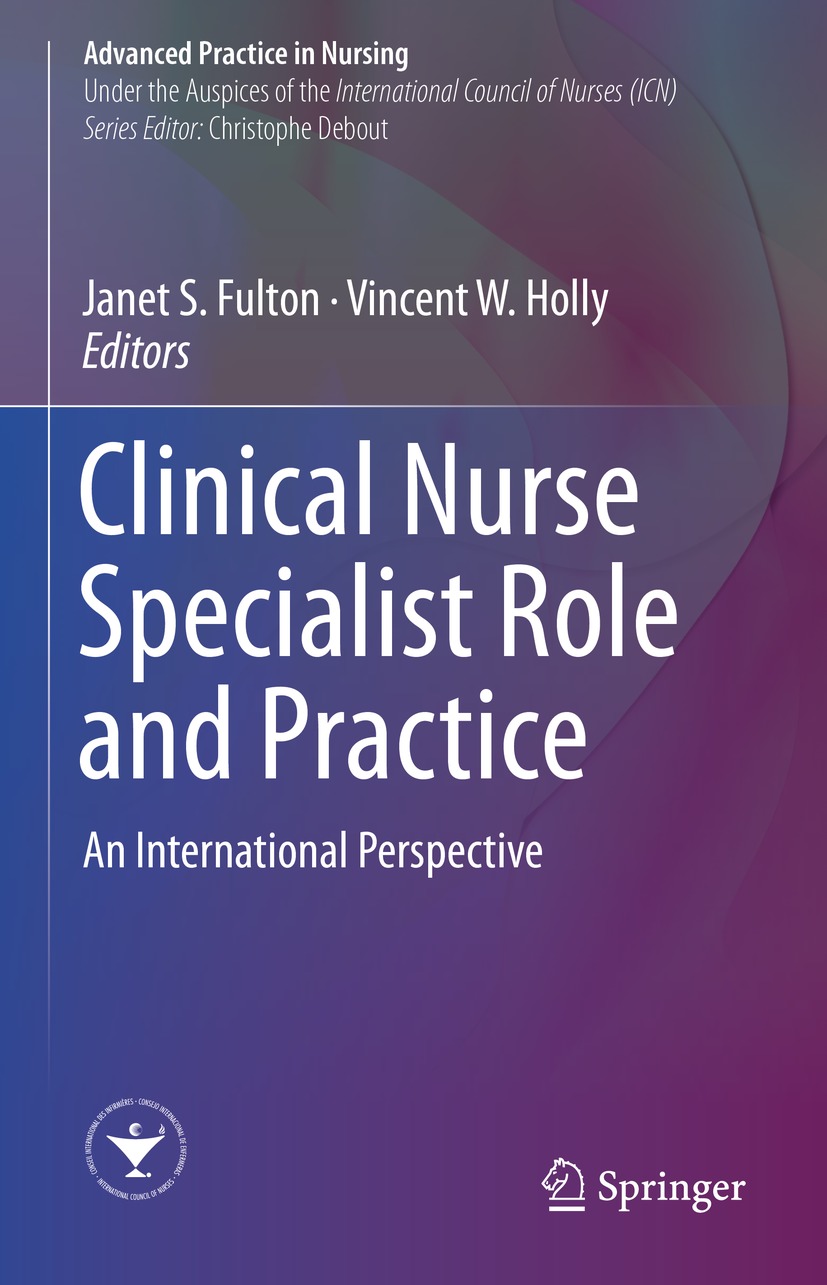Advanced Practice in Nursing Under the Auspices of the International Council of Nurses (ICN)
Series Editor
Christophe Debout
GIP-IFITS, Health Chair Sciences- Po Paris/IDS UMR Inserm 1145, Paris, France
This series of concise monographs, endorsed by the International Council of Nurses, explores various aspects of advanced practice nursing at the international level.
The ICN International Nurse Practitioner/Advanced Practice Nursing Network definition has been adopted for this series to define advanced practice nursing: A Nurse Practitioner/Advanced Practice Nurse is a registered nurse who has acquired the expert knowledge base, complex decision-making skills and clinical competencies for expanded practice, the characteristics of which are shaped by the context and/or country in which s/he is credentialed to practice. A master's degree is recommended for entry level.
At the international level, advanced practice nursing encompasses two professional profiles:
Nurse practitioners (NPs) who have mastered advanced practice nursing, and are capable of diagnosing, making prescriptions for and referring patients. Though they mainly work in the community, some also work in hospitals. Clinical nurse specialists (CNSs) are expert nurses who deliver high-quality nursing care to patients and promote quality care and performance in nursing teams.
The duties performed by these two categories of advanced practice nurses on an everyday basis can be divided into five interrelated roles:
Clinical practice
Consultation
Education
Leadership
Research
The series addresses four topics directly related to advanced practice nursing:
APN in practice (NPs and CNSs)
Education and continuous professional development for advanced practice nurses
Managerial issues related to advanced practice nursing
Policy and regulation of advanced practice nursing
The contributing authors are mainly APNs (NPs and CNSs) recruited from the ICN International Nurse Practitioner/Advanced Practice Nursing Network. They include clinicians, educators, researchers, regulators and managers, and are recognized as experts in their respective fields.
Each book within the series reflects the fundamentals of nursing / advanced practice nursing and will promote evidence-based nursing.
More information about this series at http://www.springer.com/series/13871
Editors
Janet S. Fulton and Vincent W. Holly
Clinical Nurse Specialist Role and Practice
An International Perspective
1st ed. 2021

Logo of the publisher
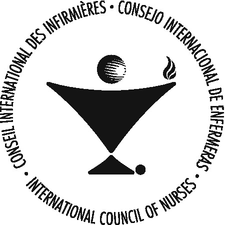
Logo of the publisher
Editors
Janet S. Fulton
School of Nursing, Indiana University, Indianapolis, IN, USA
Vincent W. Holly
Indiana University Health, IU Hospital, Bloomington, IN, USA
ISSN 2511-3917 e-ISSN 2511-3925
Advanced Practice in Nursing
ISBN 978-3-319-97102-5 e-ISBN 978-3-319-97103-2
https://doi.org/10.1007/978-3-319-97103-2
Springer Nature Switzerland AG 2021
This work is subject to copyright. All rights are reserved by the Publisher, whether the whole or part of the material is concerned, specifically the rights of translation, reprinting, reuse of illustrations, recitation, broadcasting, reproduction on microfilms or in any other physical way, and transmission or information storage and retrieval, electronic adaptation, computer software, or by similar or dissimilar methodology now known or hereafter developed.
The use of general descriptive names, registered names, trademarks, service marks, etc. in this publication does not imply, even in the absence of a specific statement, that such names are exempt from the relevant protective laws and regulations and therefore free for general use.
The publisher, the authors and the editors are safe to assume that the advice and information in this book are believed to be true and accurate at the date of publication. Neither the publisher nor the authors or the editors give a warranty, expressed or implied, with respect to the material contained herein or for any errors or omissions that may have been made. The publisher remains neutral with regard to jurisdictional claims in published maps and institutional affiliations.
This Springer imprint is published by the registered company Springer Nature Switzerland AG
The registered company address is: Gewerbestrasse 11, 6330 Cham, Switzerland
Preface
Across the world, nursing developed as a profession influenced by local, regional, and national policies, politics, norms, and traditions. Regardless of the path taken by the profession in any one country, nurses are universally committed to the health and well-being of the public we serve. As nurses, we strive to assure care and comfort for our fellow humans by preventing or reducing risk of disease and harm, relieving distressing symptoms, promoting physical and cognitive functioning, and maximizing quality of life. Nursing interventions are universal in scientific grounding yet unique in application. All nurses, regardless of educational preparation, regulatory title, or professional credentials, are dedicated to that one same mission.
Responding to the publics need for expanded, advanced, and complex care interventions, the nursing profession is creating clinicians to practice at advanced levels and in expanded scopes. Advanced practice nurse roles are established in some countries and evolving or still emerging in other countries. These advanced nurses have expert knowledge, complex decision-making abilities, and enhanced skills. First prepared as a generalist registered nurse, advanced practice nurses hold graduate degrees and other credentials necessary for authority to practice. In places where graduate nursing degrees are not available, transition programs are filling the gap between generalist education and advanced practice education.
The clinical nurse specialist is one of several advanced practice nursing roles. Other advanced practice nursing roles include the nurse practitioner, nurse anesthetist, and, in some countries, the nurse midwife (depending on educational preparation and scope of practice). A few countries, including Australia, the United Kingdom, and Hong Kong, use the title Clinical Nurse Consultant (CNC) to designate a practice role consistent with CNS practice. We recognize that a nurse specialist, defined by the International Council of Nurses as a nurse prepared beyond the level of a generalist and authorized to practice in a specialty area with advanced expertise, has extensive experience, completed specialized courses, and/or on-the-job training. Specialist nurses are an important step in developing the advanced role of clinical nurse specialist.
In 2000, the International Council of Nurses created a special interest group for advanced practice nurses, the International Nurse Practitioner/Advanced Practiced Nursing Network, giving advanced practice nurses in differing roles an opportunity to network, collaborate, and move forward together. Clinical nurse specialists are engaged in the network. Advanced nursing roles have a common core that is molded by the country in which practice occurs. This book explores practice competencies, educational qualifications, credentialing, and regulation for clinical nurse specialists in 15 different countries across North America, Europe, Asia, Africa and Middle East, and Oceania. Chapter examine clinical nurse specialist by country, including the United States, Canada, United Kingdom, Ireland, Finland, France, Germany, Japan, China, Taiwan, Turkey, Saudi Arabia, Nigeria, Australia, and New Zealand. Each chapter includes a brief history of the clinical nurse specialist role, a definition, conceptualization of practice/practice competencies, educational requirements, and credentialing. Challenges and opportunities are discussed, and each chapter concludes with an exemplar of clinical nurse specialist practice in that country.



